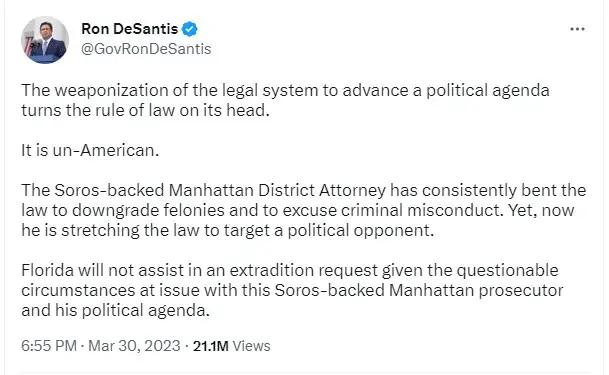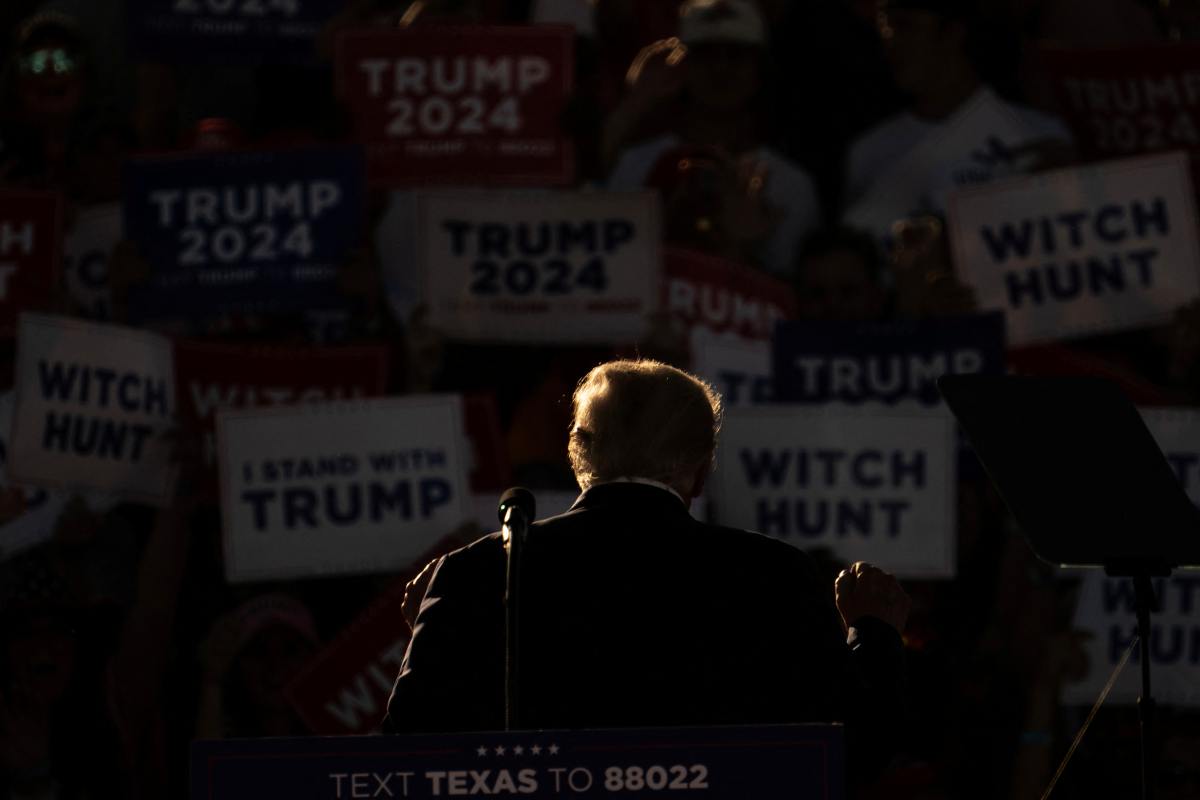Former President Donald Trump has reportedly been indicted by a Manhattan grand jury and will surrender himself next week, possibly on Tuesday, when he will be fingerprinted and have his picture taken.
The indictment news was first reported by The New York Times which received a well-placed and highly convenient leak from “people familiar with the matter.”
The precise list of the charges hasn’t yet been released but will surface sometime before the former president appears before the court next week:
The exact nature of the charges was unclear Friday because the indictment remained under seal, but they stem from payments made during the 2016 presidential campaign to silence claims of an extramarital sexual encounter. Prosecutors said they were working to coordinate Trump’s surrender, which could happen early next week. They did not say whether they intended to seek prison time in the event of a conviction, a development that wouldn’t prevent Trump from seeking and assuming the presidency.
The indictment, the first against a former U.S. president, injects a local district attorney’s office into the heart of a national presidential race and ushers in criminal proceedings in a city that the ex-president for decades called home. Arriving at a time of deep political divisions, the charges are likely to reinforce rather than reshape dueling perspectives of those who see accountability as long overdue and those who, like Trump, feel the Republican is being targeted for political purposes by a Democratic prosecutor.
To say these charges are politically motivated is an understatement. In prior instances, payments made on behalf of candidates have either drawn no scrutiny or ended with minimal legal trouble and perhaps a fine at worst.
In 2022, the campaign of Hillary Clinton settled with the Federal Election Commission and agreed to pay fines for the misuse of funds to pay for the infamous and discredited Steele Dossier.
In Trump’s case, Manhattan DA Alvin Bragg, a man who is building his career on releasing violent criminals while he works overtime to prosecute Donald Trump, is upgrading a misdemeanor offense of falsifying business records to a felony so it carries more weight.
Here’s the next question. Would this indictment and possibly even a conviction disqualify Trump from running for President or assuming the office if he wins?
According to the U.S. Constitution, nothing would change:
What are the consequences of an indictment and potential trial for his campaign and, if his effort is successful, his future presidency? Article II of the U.S. Constitution sets forth very explicit qualifications for the presidency: The president must be 35 years of age, a U.S. resident for 14 years and a natural-born citizen. In cases involving analogous qualifications for members of Congress, the Supreme Court has held that such qualifications form a “constitutional ceiling” – prohibiting any additional qualifications to be imposed by any means.
Thus, because the Constitution does not require that the president be free from indictment, conviction or prison, it follows that a person under indictment or in prison may run for the office and may even serve as president. This is the prevailing legal standard that would apply to former President Trump. The fact of his indictment and potential trial is irrelevant to his qualifications for office under the Constitution.
Essentially, the voters would be the ones deciding whether Trump’s legal troubles disqualify him from office.
Because this indictment is happening now, mostly before the 2024 Republican primary gets underway, it will be voters in the early primary states that have to make this decision first. If Trump survives the primary, of which he’s still arguably the front-runner, then it’ll be on to the general election for the rest of the country to render a verdict.
According to Margo Cleveland, writing for The Federalist, Bragg’s prosecution of Trump is akin to soviet-style harassment of political opposition by local prosecutors intent on using the legal system as a political weapon:
The Democrat district attorney, Alvin L. Bragg, breathed new life into the infamous boast of Joseph Stalin’s secret police chief, Lavrentiy Beria, when the Manhattan prosecutor targeted the former president in connection to a 2016 payment made to Stormy Daniels. Bragg’s decision to push for an indictment against Trump, presumably for falsifying business records, promises to herald in a new political age — one in which local prosecutors will target partisan enemies, big and small, making a mockery of the criminal justice system in the process.
The fact that news of the charges leaked to the left’s favorite scribes at The New York Times, while the indictment remained still under seal, punctuates perfectly the Sovietesque times in which we live: The legacy media may not be state-run, but they peddle propaganda nonetheless.
Florida Gov. Ron DeSantis issued a statement condemning the indictment:
For the moment, at least until the indictment is unsealed, the public tends to agree with the view that the harassment of Trump stems from political motivations rather than a desire for justice:
Most Americans think Manhattan DA Alvin Bragg’s investigation of former President Donald Trump over “hush money” payments to p-rn star Stormy Daniels is a political attack, according to a new national poll.
The Quinnipiac University survey found that 62% said the grand jury inquiry has been “mainly motivated by politics,” while just 32% said the probe was “mainly motivated by the law.”
The poll also found that 93% of Republicans and 70% of independents believed Bragg’s probe was politically motivated, while only 29% of Democrats said the same.
The implication of this poll is that while the American public believes that no one is above the law, they remain incredulous when laws are applied in what seems to be a one-way direction against one side of the political aisle while other infractions remain unnoticed.
Multiple members of President Biden’s family, including likely Joe Biden himself, have now been exposed for collecting money from Chinese companies with no accountability whatsoever and the same people cheering Trump’s indictment haven’t noticed.
The Trump indictment, regardless of what happens, probably isn’t going to slow anything down.
Much to the contrary, Trump thrives on chaos and will use it as newfound political ammunition to push back harder than ever as he seeks the White House in 2024.
